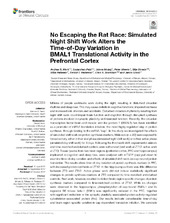No escaping the rat race: simulated night shift work alters the time-of-day variation in BMAL1 translational activity in the prefrontal cortex
Marti, Andrea Rørvik; Patil, Sudarshan; Mrdalj, Jelena; Meerlo, Peter; Skrede, Silje; Pallesen, Ståle; Pedersen, Torhild; Bramham, Clive R.; Grønli, Janne
Peer reviewed, Journal article
Published version

Åpne
Permanent lenke
https://hdl.handle.net/1956/18037Utgivelsesdato
2017-10-04Metadata
Vis full innførselSamlinger
Originalversjon
https://doi.org/10.3389/fncir.2017.00070Sammendrag
Millions of people worldwide work during the night, resulting in disturbed circadian rhythms and sleep loss. This may cause deficits in cognitive functions, impaired alertness and increased risk of errors and accidents. Disturbed circadian rhythmicity resulting from night shift work could impair brain function and cognition through disrupted synthesis of proteins involved in synaptic plasticity and neuronal function. Recently, the circadian transcription factor brain-and-muscle arnt-like protein 1 (BMAL1) has been identified as a promoter of mRNA translation initiation, the most highly regulated step in protein synthesis, through binding to the mRNA “cap”. In this study we investigated the effects of simulated shift work on protein synthesis markers. Male rats (n = 40) were exposed to forced activity, either in their rest phase (simulated night shift work) or in their active phase (simulated day shift work) for 3 days. Following the third work shift, experimental animals and time-matched undisturbed controls were euthanized (rest work at ZT12; active work at ZT0). Tissue lysates from two brain regions (prefrontal cortex, PFC and hippocampus) implicated in cognition and sleep loss, were analyzed with m7GTP (cap) pull-down to examine time-of-day variation and effects of simulated shift work on cap-bound protein translation. The results show time-of-day variation of protein synthesis markers in PFC, with increased protein synthesis at ZT12. In the hippocampus there was little difference between ZT0 and ZT12. Active phase work did not induce statistically significant changes in protein synthesis markers at ZT0 compared to time-matched undisturbed controls. Rest work, however, resulted in distinct brain-region specific changes of protein synthesis markers compared to time-matched controls at ZT12. While no changes were observed in the hippocampus, phosphorylation of cap-bound BMAL1 and its regulator S6 kinase beta-1 (S6K1) was significantly reduced in the PFC, together with significant reduction in the synaptic plasticity associated protein activity-regulatedcytoskeleton-associated protein (Arc). Our results indicate considerable time-of-day and brain-region specific variation in cap-dependent translation initiation. We concludethat simulated night shift work in rats disrupts the pathways regulating the circadian component of the translation of mRNA in the PFC, and that this may partly explain impaired waking function during night shift work.
